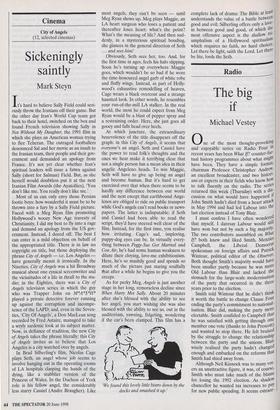Cinema
City of Angels (12, selected cinemas)
Sickeningly saintly
Mark Steyn
It's hard to believe Sally Field could seri- ously throw the Iranians off their game. But the other day Iran's World Cup team got back to their hotel, switched on the box and found French television showing Sally in Not Without My Daughter, the 1991 film in which she plays an American woman trying to flee Teheran. The outraged footballers denounced Sal and her movie as an insult to the Iranian team, their people and their gov- ernment and demanded an apology from France. It's not yet clear whether Iran's spiritual leaders will issue a fatwa against Sally (short for Salman) Field. But, as she herself would doubtless put it at the next Iranian Film Awards (the Ayatollies), 'You don't like me. You really don't like me.'
Most of us can only envy those Persian footie boys: how wonderful it must be to be thrown into a fury by a Sally Field picture. Faced with a Meg Ryan film promoting Hollywood's woozy New Age travesty of Christianity, I did my best to fly into a rage and demand an apology from the US gov- ernment. Instead, I dozed off. The best I can enter is a mild objection on behalf of the appropriated title. There is in law no copyright on title, but those deploying the phrase City of Angels — i.e. Los Angeles have generally meant it ironically. In the Nineties, City of Angels was a hit Broadway musical about one cynical screenwriter and the vicissitudes of a life in thrall to the stu- dio; in the Eighties, there was a City of Angels television series in which the guy who was Trapper John on M*A*S*H* played a private detective forever running up against the corruption and incompe- tence of the LAPD; and, even in the Seven- ties, 'City Of Angels', a Don MacLean song recorded by Fred Astaire, managed to take a wryly sardonic look at its Subject matter. Now, in defiance of tradition, the new City of Angels takes the phrase literally: this City of Angels invites us to believe that Los Angeles is a city watched over by angels.
In Brad Silberling's film, Nicolas Cage plays Seth, an angel whose job seems to involve hanging out in the operating rooms of LA hospitals clasping the hands of the dying, like a stubblier version of the Princess of Wales. In the Duchess of York role is his fellow angel, the considerably less starry Cassiel (Andre Braugher). Like most angels, they can't be seen — until Meg Ryan shows up. Meg plays Maggie, an LA heart surgeon who loses a patient and thereafter loses heart: what's the point? What's the meaning of life? And then sud- denly, in a mysterious spiritual bonding, she glances in the general direction of Seth . and sees him!
Obviously, Seth sees her, too. And, for the first time in ages, feels his halo slipping. Soon he's turning up everywhere Maggie goes, which wouldn't be so bad if he wore the time-honoured angel garb of white robe and fluffy wings. Instead, as part of Holly- wood's exhaustive remodelling of heaven, Cage wears a black overcoat and a strange haunted look. In other words, he resembles your run-of-the-mill LA stalker. In the real world, the most he could expect from Meg Ryan would be a blast of pepper spray and a restraining order. Here, she just goes all gooey and falls head over heels.
At which juncture, the extraordinary benevolence of the title disappears off the graph: in this City of Angels, it seems that everyone's an angel. Seth and Cassiel have the power to read folk's thoughts and the ones we hear make it terrifying clear that not a single person has a mean idea in their angelic Angeleno heads. To win Maggie, Seth will have to give up being an angel and become human. But it's hard to get exercised over that when there seems to be hardly any difference between our world and the next except that earthbound Ange- lenos are obliged to ride on public transport while God's angels can't read books or news- papers. The latter is indisputable: if Seth and Cassiel had been able to read the script, they'd have steered well clear of the film. Instead, for the first time, you realise how irritating Cage's sad, imploring, puppy-dog eyes can be. In virtually every- thing between Peggy-Sue Got Married and Con Air, he's had some human weakness to dilute their cloying, love-me exhibitionism. Here, he's so mushily good and spends so much of the picture just staring soulfully that after a while he begins to give you the creeps.
As for perky Meg, Angels is just another stage in her long, remorseless decline since When Harry Met Sally. About 20 minutes after she's blessed with the ability to see her angel, you start wishing she was also blessed with the ability to see us, out in the auditorium, yawning, fidgeting, wondering if the car's been clamped. This film has a We found this lovely little-bistro down by the docks and smashed it up.' complete lack of drama: The Bible at least understands the value of a battle between good and evil; Silberling offers only a love- in between good and good, of which the most offensive aspect is the shallow tri- umphalism of a Hollywood spiritualism which requires no faith, no hard choices. Let there be light, saith the Lord. Let there be lite, lords the Seth.


























































 Previous page
Previous page